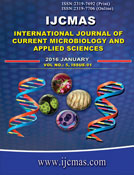


 National Academy of Agricultural Sciences (NAAS)
National Academy of Agricultural Sciences (NAAS)

|
PRINT ISSN : 2319-7692
Online ISSN : 2319-7706 Issues : 12 per year Publisher : Excellent Publishers Email : editorijcmas@gmail.com / submit@ijcmas.com Editor-in-chief: Dr.M.Prakash Index Copernicus ICV 2018: 95.39 NAAS RATING 2020: 5.38 |
Studies were carried out to determine the sensitivity of pathogenic Gram-negative bacteria to electrochemically activated 3% aqueous sodium chloride solution (anolyte). From the resulting 100% anolyte in the experiments were used different final concentrations 100%, 50%, 25% and 12,5%. As a control was used the disinfectant Virkon S, applied at final concentrations of 1%, 0,5%, 0,25% and 0,125%. Tested were Escherichia coli O45, Salmonella enterica ATCC and two strains of Pseudomonas aeruginosa ( 318 and 450). It has been found that anolyte at a concentrations 25-100% fully inactivates suspensions of E. coli with a density of 10 6 cells/ml for 2 min. At decreasing the concentration below 25% the inactivation time was increased. Anolyte in all tested concentrations (12,5 to 100%) inactivated the suspensions of 10 6 cells/ml of both examined strains of P. aeruginosa (318 and 450) within 2 min. Also anolyte in concentrations from 12,5 to 100% completely inactivated suspensions of S. enterica with a densities of 106 cells/ml and 108 cells/ml for 2 min. The same effect had and Virkon S in all tested concentrations (from 1% to 0,125%). The results of studies show that anolyte exhibits very high and rapid bactericidal activity against Gram-negative bacteria. In suspensions with a concentration 106 cells/ml they die within 2 minutes in the presence of anolyte. The antibacterial activity of anolyte is completely analogous with that of the control preparation Virkon S. These results convincingly demonstrate that anolyte is promising antibacterial agent with very high activity.
 |
 |
 |
 |
 |